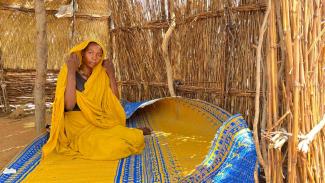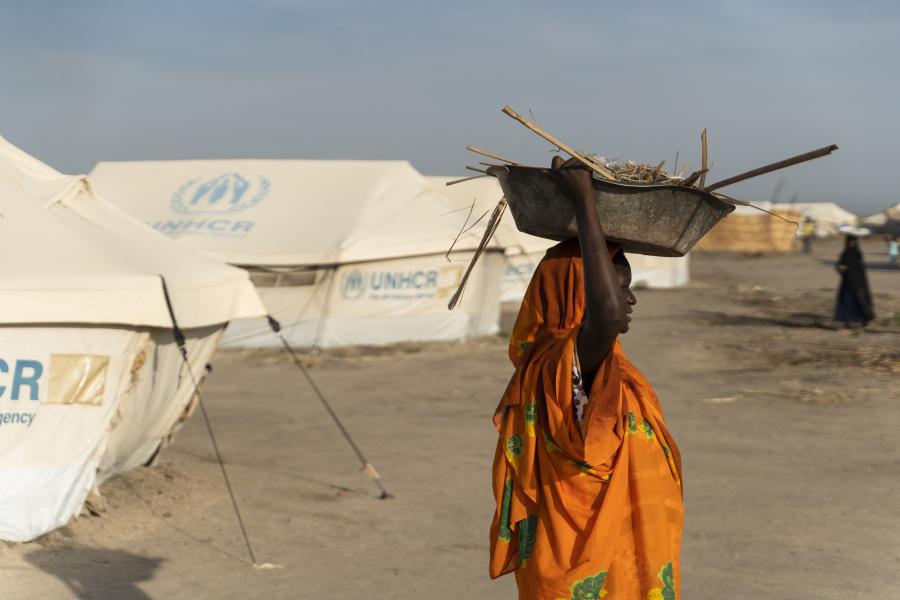Year-end population figures | 2023
2023 situation overview
Conflict erupted in the Sudan after fighting broke out in Khartoum between the Sudanese Armed Forces and the Rapid Support Forces in April 2023, triggering the largest humanitarian crisis in the region. By 31 December 2023, 6.1 million Sudanese were newly internally displaced, while over 1.5 million people had fled to the Central African Republic (CAR), Chad, Egypt, Eritrea, Ethiopia, Libya, Rwanda, South Sudan and Uganda. Among those leaving the country were refugees who had sought safety in the Sudan prior to the conflict.
UNHCR was already responding to the needs of large refugee and IDP populations in Sudan and neighbouring countries. The six UNHCR country operations involved in the response were already severely underfunded when the new emergency arose, causing humanitarian needs to grow exponentially. The revised Humanitarian Response Plan 2023 estimated that almost 25 million people were in need in Sudan.
In Sudan, UNHCR led the inter-agency refugee response with the Government’s Commission for Refugees (COR). UNHCR’s existing IDP response was focused on the Darfur region, where the majority of internally displaced people from previous conflicts were located. UNHCR coordinated the Protection and Shelter/Non-Food Items Clusters and, when the new conflict began, it reactivated the Site Management sector (Camp Coordination and Camp Management Cluster) in 15 of 18 states in Sudan.
With most IDPs living in host communities, UNHCR’s IDP response followed a community-based approach that enabled displaced and host communities to identify their most critical needs and the solutions most appropriate to them. To support newly established community centres, over 100 community-based protection networks were set up and 2,000 volunteers were trained to provide mobile outreach and services.
UNHCR and its partners also provided close to 130,000 IDPs and individuals in vulnerable hosting communities with core relief items and shelter assistance. Another 24,000 people received emergency shelter kits or cash for shelter or tents.
To support self-reliance and boost the local economy, UNHCR also provided multi-purpose cash assistance to the most vulnerable forcibly displaced people and host community members. From the start of the conflict over 100,000 people were assisted, injecting over $3.6 million into the local economy. Cash was provided based on an agreed set of criteria, with each member of eligible households receiving $45 for a three-month period.
As people began to flee to neighbouring countries, UNHCR together with partners immediately worked together to produce the Regional Refugee Response Plan to coordinate actions and highlight the needs.
In the Central African Republic, a single-entry point in the northeastern district of Vakaga expanded to multiple arrival routes and nine spontaneous settlements across five districts. As of December 2023, UNHCR and partners had provided a total of 25,200 forcibly displaced people with protection services and 10,600 refugees had completed biometric registration. Food assistance was provided to 9,700 people and more than 640 emergency shelters were provided. UNHCR and partners also supported the Government of the CAR in establishing the Korsi settlement, a new 50-hectare site within the town of Birao, where some 2,800 Sudanese refugees had relocated by the end of the year.
In Chad, five new sites were opened to accommodate new arrivals, and existing sites were expanded where space allowed. 217,700 new arrivals were relocated from border areas to new sites, where greater security and more services were available. UNHCR, UNICEF and their partners provided psychosocial support to 62,000 children. The inter-agency protection monitoring system, Project 21, was expanded to eastern Chad to ensure regular and accurate data collection to drive evidence-based programming.
Egypt received 409,000 individuals who fled from Sudan, according to official figures provided by the Government. UNHCR and partners provided new arrivals with protection services and provided cash assistance to the most vulnerable. UNHCR partnered with the Egyptian Red Crescent to provide life-saving assistance at the borders. By the end of 2023, 472,800 refugees and asylum-seekers were registered in Egypt, 200,015 of them newly registered in 2023. Three-quarters of those registered in 2023 were Sudanese. The increasing numbers seeking asylum in Egypt required UNHCR and partners to rapidly expand registration processing. Entry restrictions from June onwards impacted the ability of Sudanese and third country nationals to enter Egypt through regular channels. From the start of the Sudan conflict until the end of 2023, UNHCR assisted 47,359 Sudanese in Egypt with one-off emergency cash assistance to help pay for their most pressing needs, including rent, food and health.
In Ethiopia, the Government issued guidelines enabling the registration of all arrivals from Sudan in need of international protection, a key milestone for the protection of refugees. In all locations hosting Sudanese refugees in Ethiopia, UNHCR established protection desks to identify people requiring immediate referrals. This included assessing their vulnerability, providing counselling, monitoring and reporting on protection concerns, and making urgent referrals to relevant partners. WFP food distribution was suspended in June 2023 after reports of widespread diversion of its food aid in Ethiopia.
It resumed in October 2023 and three rounds of general food distribution were successfully completed by the end of the year, reaching 23,500 people in Metema and Kumer and 14,600 refugees in Kurmuk. UNHCR provided multi-purpose cash assistance for 691 vulnerable households at the Metema transit site, with each household receiving approximately $110. A shortage of funds meant that cash disbursements were inadequate and UNHCR had to prioritize by choosing beneficiaries among very vulnerable groups.
UNHCR’s emergency response in South Sudan focused on life-saving assistance at the border and in transit, with a priority on the onward transportation of returnees, refugees, asylum-seekers and third-country nationals to their final destination in coordination with partners. 244,100 returnees and refugees received protection services in transit and areas of destination. Child protection partners assisted over 145,300 vulnerable girls and boys at various locations with child protection services, including case management, mental health support, family tracing, and awareness activities. Since the start of the response, WFP and food security partners provided 412,500 individuals with hot meals, dry rations, cash-based transfers or high-energy biscuits at various points, including reception centres at the border, transit centres and final intended destinations. Returnees received a three-month food assistance ration, either in-kind or cash-based transfers, depending on the location of their final intended destination.
UNHCR engaged with development actors early in this crisis. Refugee-hosting governments agreed to create integrated settlements with shared social services for refugees and hosts, although this required support from development donors. Assistance was also required to help stabilize areas to which their own citizens were returning in difficult circumstances, such as in South Sudan.
In September 2023, UNHCR and 63 partner organizations published a revised inter-agency Sudan Emergency Regional Refugee Response Plan, covering May to December 2023, which appealed for $1 billion to provide essential aid and protection to over 1.8 million people expected to flee from Sudan and arrive in five neighbouring countries by the end of 2023. As of 31 December 2023, only 38% ($385 million) of the funding requirements were met. This underfunding meant that plans could not be fully implemented and there was a risk of fragile communities being further destabilized, with potentially wider and longer-term impacts on regional peace and security.
Financial overview
Sudanese refugees fleeing Darfur find safety in Chad
By Lalla Sy in Farchana, Chad
After fleeing horrific violence in Sudan’s West Darfur, refugees are arriving to Chad traumatized and with children who are often malnourished. Zeinab, 22, recalls the morning in May when armed men attacked her house in El Geneina, capital of Sudan’s West Darfur State.
Read the story

